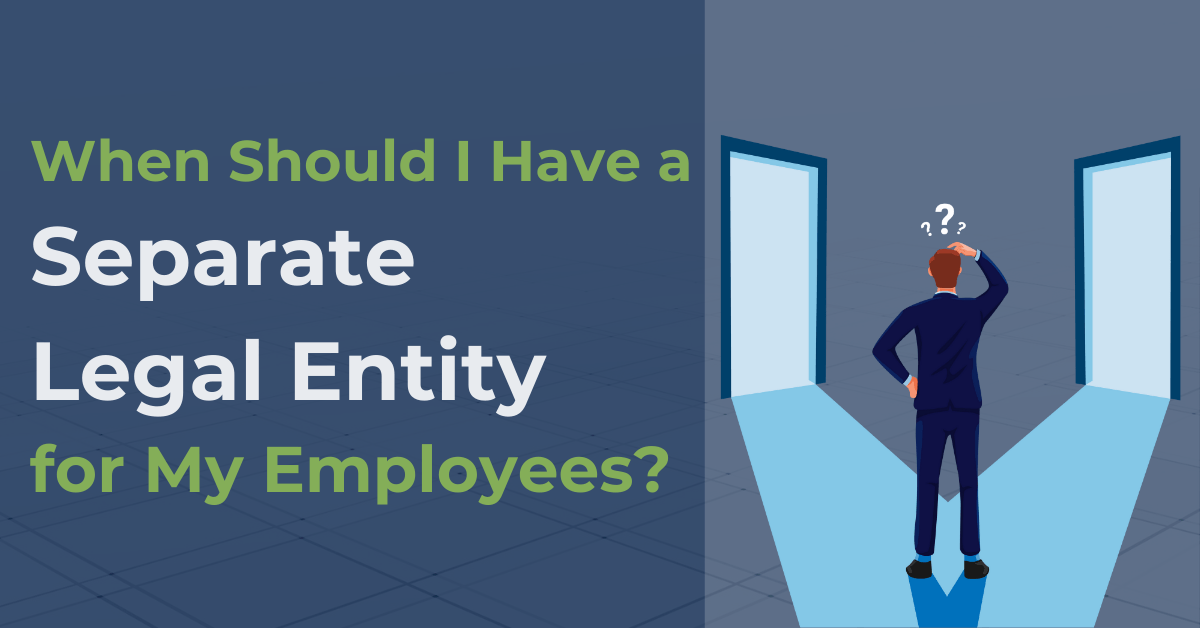When Should I Have a Separate Legal Entity for My Employees?
August 21st, 2024 | 3 min. read
By Matt Patrick

When running or starting a small business, we’ve talked about the need to have a number of checking accounts, including a payroll checking account. An additional suggestion for owners, especially those with multiple locations, legal entities, or operations in several states, is to set up a separate legal entity just to employ your staff.
This approach can provide several benefits, from protecting your business to making payroll a whole lot easier.
In this article, we’ll walk you through why and when you might want to take this step.
Why Think About a Separate Legal Entity?
You’ve heard the phrase “Don’t put all your eggs in one basket,” right? The same logic applies here. Let’s talk about how splitting your business into separate legal entities might actually simplify your life—and help you sleep better at night.
Liability Protection
Let’s start with the big one: liability protection. Running a business means taking on risks, and while you can’t avoid them all, you can certainly manage them.
By setting up a separate legal entity specifically for your employees, you’re essentially building a shield around your main business. If something goes wrong—say an employee gets injured on the job or there’s a legal issue—the liability is generally confined to the entity that employs the workers. This means your primary business assets stay protected from potential lawsuits or legal claims.
This approach is particularly valuable if you’re operating in multiple locations or industries where the risk of legal claims might be higher. Think of it as an extra layer of security that lets you focus on growing your business, without constantly looking over your shoulder.
The Tax Advantages
Taxes—no one loves dealing with them, but managing them wisely can save you a lot of money.
Creating a separate legal entity could do more than just protect your assets; it could also save you some serious cash. If you have employees working across multiple entities within your business, the tax implications can get complicated fast.
For instance, in Tennessee, unemployment taxes are calculated on the first $7,000 of wages. If an employee earns $7,000 at each of the two entities, you could end up paying double the state unemployment taxes. Ouch.
By consolidating your employees under one legal entity, you streamline this process. Not only do you avoid redundant tax payments, but you also improve your overall tax efficiency. Plus, this setup makes payroll easier, as all your employees are treated under one tax ID. It’s simpler, cleaner, and much less likely to give you a headache come tax season.
Simpler to Manage, More Accurate Payroll
Payroll is one of those things that you absolutely have to get right, but it’s also one of the easiest places to make mistakes, especially if your employees are clocking hours at different locations or in various roles.
Getting Payroll Right, Every Time
Imagine this: one of your team members works 30 hours at one site and 20 at another. If not handled properly, you as an employer can easily find yourself in hot water with the Department of Labor. More importantly, paying your employees the compensation they are entitled to is a key part of being a good employer.
That’s where having a separate legal entity for payroll can make life easier. By funneling all hours worked into one system, you reduce the chances of errors and ensure everyone is paid accurately and on time.
It’s not just about avoiding legal trouble; it’s about building trust with your team by showing them you’ve got their back when it comes to their paychecks.
Simplifying Your Tax Reporting (because less paperwork is always a good thing)
We all know paperwork isn’t anyone’s favorite part of running a business, but it’s a necessary evil. The good news is, with a separate legal entity, you can cut down on the amount of it.
Easier Reporting For You And Your Employees
Instead of juggling multiple sets of payroll tax forms for different entities, you only need to handle one set.
This means you only need to file one Federal Form 940 and Form 941, along with one set of state withholding and unemployment returns for each state where you operate.
And your employees?
They’ll thank you too—they only receive one W-2 from you. There is already enough paperwork to do, so why add more than is necessary?
Is a Separate Legal Entity Right for Your Small Business?
Creating a separate legal entity for your employees can offer significant benefits, from protecting your business to simplifying your payroll and tax processes.
But it’s not a one-size-fits-all solution. It depends on the unique aspects of your business, the states where you operate, and how complex your payroll and tax situation is. It’s essential to evaluate your specific needs and challenges before making this decision.
Setting up a new legal entity is just the first step in optimizing how your business operates. If you’re considering this move, it might also be time to think about whether your current payroll service is still the best fit for your evolving business needs. After all, the right payroll provider can make all the difference in how smoothly your operations run.
Wondering how to make the switch without the stress? Check out our guide on How to Switch Payroll Services Smoothly.
Topics: